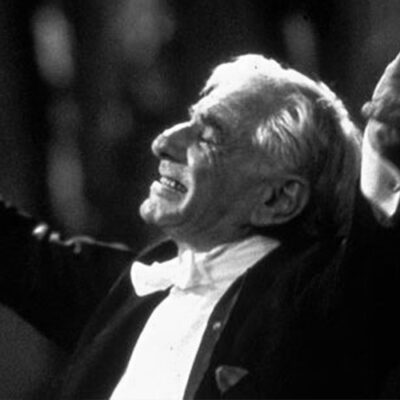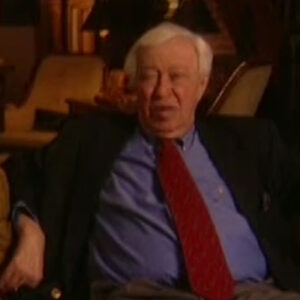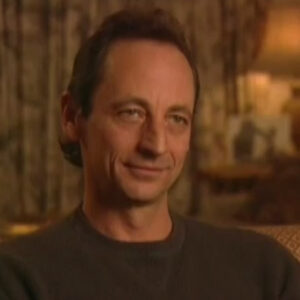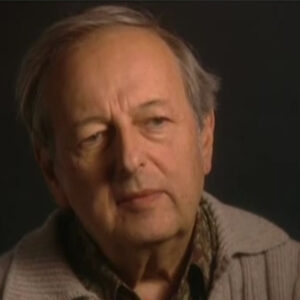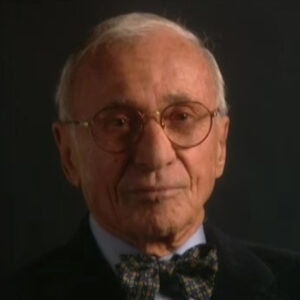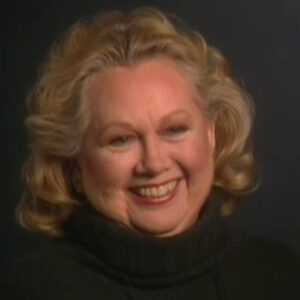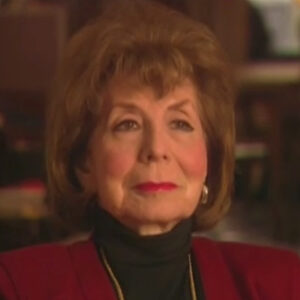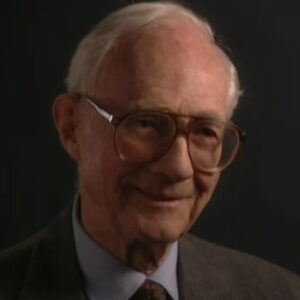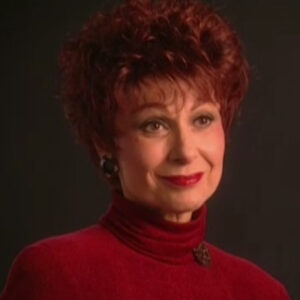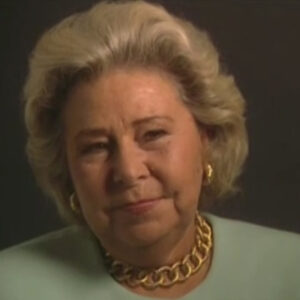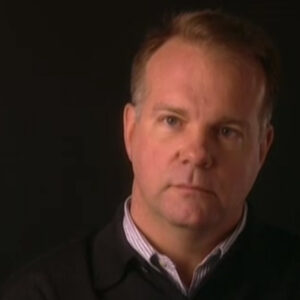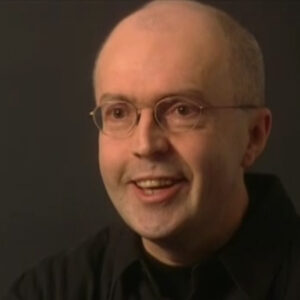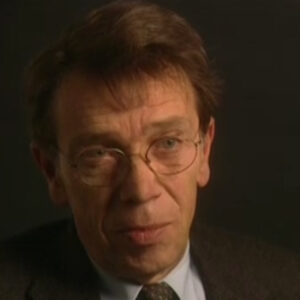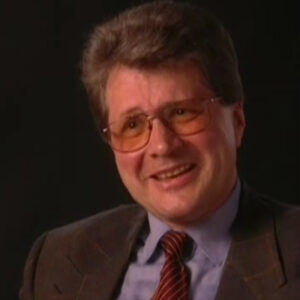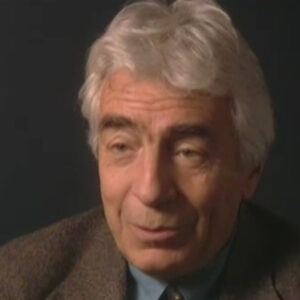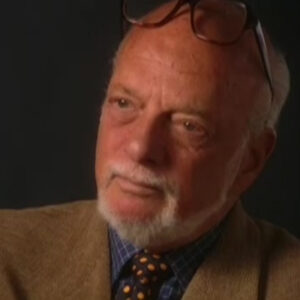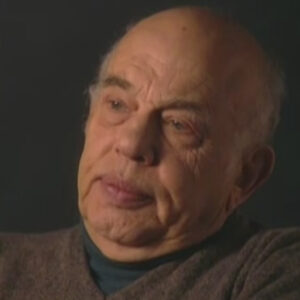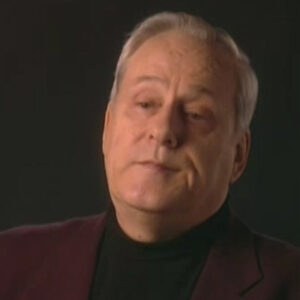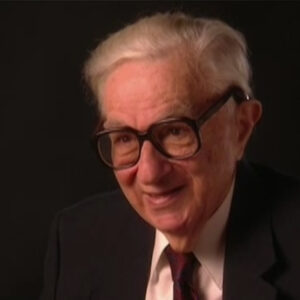Speaker I met Lenny in 1931 and he was 13 and I was 12, and we became steadfast, steadfast friends as young kids will at that time, and we were inseparable.
Speaker And we spent we spent all day just talking and musing about the future as kids will do. And. One day we were visiting a friend of ours named Eddie Riak, and when he was trying to teach Eddie to play Good Night, Sweetheart, and.
Speaker Eddie was trying desperately to play it, and Lenny was getting a little upset that Eddie could not play it, and I was getting a little bit edgy because I said it’s so simple to play. Why can’t he play it? And so suddenly I sat down at the piano and I said, You mean maybe you ought to go this way? And I played it probably poorly, but I played it. And then he said, Well, you are the one I should be teaching. And that’s how we really began a relationship that lasted for a long, long time.
Speaker I guess it would be. Teacher and student, and that never ended, and I think that’s why we we were so close, because I, I listened. And I just listened because I love to hear him speak even then, he was so articulate. And I guess the magic word with Lenny has always been teacher, and even if that time he was a teacher.
Speaker When he came over to my house from time to time and he’d see some old sheet music on the piano, I remember The Paradise Walls. That was one of the songs that he used to sit down and and play. And he’d explain it. He’d look at my mother and me and he’d say, well, you see, the reason that so-and-so did this and this was he was only 13 years old.
Speaker But even at that time, he was a teacher and an explorer and always wanted to explain things. And I was a great listener because I didn’t have much to say any anyhow, and so I, I used to love to listen to any talk and. Then I guess that’s about the extent of. Of Eddie Ray, ex house story. Lenny and I used to used to go to the we used to play baseball and we used to go skating and roller skating, that is, but that has nothing to do with with playing the piano. But it just goes to prove that even Lenny. Wanted to wanted to play play ball and do some of the things that people maybe didn’t associate with him because he knew that he wasn’t very good at it, but, you know, when he was. Was a big boy at that time physically. The strange thing is that he never became a tall person, but he was always muscular.
Speaker And he looked as if he could be a a good sportsman, but he really wasn’t wasn’t very good at it, but he was a good swimmer. I must say, when I used to visit him in Sharon was that was his summer home. One of his great feats was to see how long he could stay under under water and he could stay under water for a long time. He’d take a deep breath and.
Speaker It’s kind of ironic that that did him in in later life, but at that time, he really was capable of of getting under the water and staying there so long that I used to get worried about it.
Speaker He was down there.
Speaker But were you an official pianist? I mean, were you the one that No one?
Speaker Well, I paid him a dollar for less and yes, I guess you’d call. Well, that was when he was at Harvard, when he was at Harvard and he was at Wigglesworth Hall. He was living there.
Speaker And I would take the subway and the trolley to meet to to meet him and take my lesson. And I just didn’t want to feel that he was teaching me for nothing, so I said, Lenny, I’ve got to pay you something. And he said, Well, and how about a dollar? I said, OK. But it was a dollar plus. A Three Musketeers bar, which is what he adored, and I would always bring one with me and he would open that Three Musketeers bar and gobble it down with such relish. And I remember once it was. It was Passover and, you know.
Speaker Under the under the rules, the Jewish people aren’t supposed to eat certain foods at Passover and the Three Musketeers was on the forbidden list. So I said, well, should I bring him one or should I not? Because, you know, his father was the vice president of a temple, although Lenny was never really a religious man.
Speaker But I brought the Three Musketeers to him and I offered it to him.
Speaker He grabbed it and gobbled it down. So I said, well, I guess it doesn’t mean too much to him.
Speaker But when you said that he wasn’t a religious man.
Speaker Well, I once asked Lenny whether he was a religious man. This was this was in later later life. And he said, yes, I am a religious man, but not organized religion.
Speaker He had his own set of religious values, as we all do. But he didn’t believe in organized religion, per say.
Speaker I don’t think that, although I know that he he he loved religious music, as you can tell, and in later years.
Speaker And it’s evident in so much of his works. But he was never. Never a pious. Religious person for just for the sake of of being part of a part of being Jewish, but he had his own sets of values and we used to discuss that.
Speaker Can you elaborate on that? Well, not really much to elaborate on, except that we used to speak about. Phobias that I might have or he might have, and he didn’t have any, but I had a lot and he would try to try to discuss that with me with with a religious point of view. And it was at that time that I used to say, well, are you religious? And he used to say, I’m religious, but I’m not I don’t believe in organized religion. And there’s nothing really much to discuss about that. I mean, I don’t recall too much about what he what he had to say, but you played Florida piano to you? Oh, yes, we used to. We used to love to sit down and play for hands on one piano. And naturally, I would take the bass part because it was the easiest part.
Speaker And then he would take a treble part. And because he was he was so good.
Speaker But he would teach me the parts by rote and I would I would learn them by rote, he would he would play the part. And I would. Play it back to him and he’d say, yes, that’s that’s what I mean. So in essence, he was really playing both parts, but I was sort of the surrogate player. And in later years, I realized that wasn’t he wasn’t doing me very much of a favor doing that, because since he was a prodigious site reader, I never was a very good site reader, I guess, because he spoon fed me everything and I never had to learn to actually sight read too much myself. But we used to play the St. Louis Blues and we’d play selections from. We play Jerome Kern Selection’s we play Gershwin of the I Sing and all those wonderful, he just love that that music and I love that music and we have these long routines. And in later years, I remember once. In Fairfield, I guess it was at a birthday party that was given for me in Fairfield, my 17th, as a matter of fact, and then he said, shall we play the St. Louis Blues? So we sat down at the piano and I said, gee, you know, I think it went this way. And he said, You think it went this way. Don’t you know? And he’s played my my part exactly as it had he had as he had shown it to me many, many years ago. He had a fantastic memory. But we used to play all sorts of wonderful things, we used to play the Carioca.
Speaker Oh, that was our tour de force and Lenny was all over the keyboard. And, of course. As you know, Lenny had a croaking voice and he would sing during this every so often he’s sang a few a few bars and it was just it was a sensational time for us at that at that time.
Speaker I was working with the.
Speaker Well, when we were young, we would go to parties together and there would be girls at the party, obviously, naturally, if there was a piano in the room, it was a magnet. Lenny went right to the piano, but before he went to the piano, he would always do something that nobody else ever did. He would bow to the girls when he met a girl.
Speaker He would very, very, very courteously bow.
Speaker And then he would. Sit down at the piano, but he always was very grand when he at these parties and that was but as far as relationships with girls, I guess. It was as relationships with boys, just when you’re when you’re kids, you just don’t think too much about it. What about friends? Family? Well. Lenny’s family life. It was one that I I hesitate to speak too much about it only because it may be personal and private. I sensed that, Lenny. Had difficulty with his with his parents, with the relationship between his father and his mother, who obviously argued a lot and and upset many a lot, and many would say to me, you had your parents fight. Do they argue? And I’d say, gee, I don’t I don’t think so. And he’d say, oh, you are so lucky. You don’t hear your parents bickering and arguing all the time. So I know that he was. He was upset in hearing and seeing his his parents argue his his father was a disciplinarian. There’s no doubt of it. He was a he was a scholarly man and.
Speaker I guess, and his mother was a dream, his mother was absolutely the most wonderful woman you could possibly meet. And I remember. They had they had a car, it was a roadster at that time, it was sort of like a rumble seat in the back. I guess you probably people don’t know what that is. But it was it was a little car with a with a seat in the back. And Lenny would love to drive that that car. And his mother would sit next to him and I would be in the back. And if there was somebody else in the car and his mother was speaking to somebody else. Lenny would be driving along and all of a sudden there was a song called Lazybones, which was one of Lenny’s favorite. And in it there was the lyric by cracky. So Lenny would be singing this. When he got to buy crack, he blurted out by cracky and his mother would say, Lenny, stop. You want to say, I’m talking to somebody and how can you interrupt me? And but she was she was a wonderful, wonderful woman.
Speaker We like to spend a lot of time at your house because it was nicer than his house.
Speaker No, no. Well, he didn’t spend too much time at my house.
Speaker I don’t know why, but most of our time was spent at his house, it just seemed to work out that way. He would he would come over to my house and play the piano and but most of the time was at his house. And I don’t think Lenny really spent too much, didn’t know my parents all that well. He knew my my mother quite well because during the day she was home, my father was working, but most of the time was spent at Lenny’s house.
Speaker Did he ever talk to you about his father and mother? I mean, he’s he’s dealt with this this is quite, quite well.
Speaker Yes. Yes. Yes, exactly. Exactly.
Speaker Did he ever talk to you about his father’s how he felt about his father’s not encouraging him to music, to speak personally to.
Speaker Well, I, I don’t.
Speaker He did he he did speak about his father being disappointed in him, not going into into the into the into the family business.
Speaker And to get money to buy the pieces that he wanted to buy when he wanted to buy the Boléro, for example, or the Rhapsody in Blue or things that he was interested in, he had to beg his father for the for the money.
Speaker He finally got it. But I think that his father really didn’t care for him to pursue music. He wanted him to go into the business, which was a successful business. And Lenny just had absolutely no desire to go into that business. And but as far as the relationship with his with his father. It was one of respect.
Speaker I won’t say fear, I don’t say that at all, but I don’t think there was there was that warmth until then he got older. I think maybe that when he began to understand what motivated his father and I, I imagine he began to change.
Speaker But, you know, my relationship with money is so unusual, the fact that we were so close when we were kids, but yet.
Speaker When we got into our teens and then in 1940, when I went after the Army and was in the Army for five years, those five years between 1940 and 1945 were so important years for many. His his career blossomed and that was those were the magic years, but I was I was in the Army, so I have to share all that vicariously and we sort of I won’t say lost touch, but I wasn’t with him during so much of that.
Speaker And I always. Rue, the day that I had to go in the army because of the fact that we could have I could have enjoyed so much of that with him, I think.
Speaker And, you know, just great things.
Speaker I know it sounds corny to say Lenny was destined for greatness, but there’s no way that I that he could not have become a great a great person, a great musician. And not only musician. But he knew everything, anything you wanted to know about anything Lenny, the teacher would explain, it didn’t have to be music. It could be. Mathematics, it could be anything you wanted to know, Lenny was just. A brilliant fellow who could answer any question that you want to know about anything.
Speaker And explain it beautifully, so that was there’s a wonderful story you told them about, I just love this. You’re walking down the street. You heard some girl.
Speaker Oh, yes or no? Yeah.
Speaker Lenny and I were walking down the street one sunny afternoon and we were just meandering along, talking and we heard a piano and it was coming from a house on the block. And as we walk towards the house, we heard this laborious rendition of something. Somebody was something their way through a piece and it was just terrible. We walked by the house and Lenny stopped and we stood there for a minute. Listen to this music that was coming out of it was so bad and Lenny couldn’t resist. He ran up on the porch and he looked in side the window. And right by the window was this woman playing the piano? Well, it was by the window. So Lenny, he raised the window, jumped into the window, sat down next to the start of the woman who I don’t know what she thought, what was happening. And he said it should go like this. And he began to play the piece and played it for her. She was absolutely flabbergasted. And he stepped out the window again down the porch, and we continued our our walk. But the way he said it, with such disdain, this is the way it ought to go and then began to play. It was something that I guess I will never, ever forget. I was absolutely hysterical. It is hysterical because I love that story.
Speaker Oh, well, you kind of lost touch because the army, when you and you put together in nineteen.
Speaker Well, 1952. Yes. That would have been a wonderful time. I was I somehow stumbled into becoming an arranger. I’m not sure how I guess it was all due to Lenny because he really got me so interested in music when we were kids and there wasn’t much else that I could think that I ought to ought to be doing in this world and became an arranger of music.
Speaker And I was in New York and I had I was working on The Milton Berle Show, which was a very well-known television show, was called the Texaco Star Theater. And I learned.
Speaker A lot about about orchestration on that on that show, and Lenny was doing Wonderful Town.
Speaker I don’t know whether Lenny knew, I guess he did know that I was an arranger, but somehow he was he was working with Don Walker, who was a very, very fine orchestrator for for the theater. And I was working with a fellow named Red Ginzler, who was working with me on my show, and Don and and read. Were were sort of fishing each other out, helping orchestrate various things and then read, got busy. So he sent me up to New Haven on Wonderful Town and I said to myself, Joe, I wonder what Lenny’s going to think when I walk in and he sees me. And sure enough, he was absolutely flabbergasted when I walked in.
Speaker And Don was up to his ears with with music, and so I, I stepped in to do some of the arrangements.
Speaker And Lenny still couldn’t believe it. We went to we went to the theater to talk to routine, something called the Conga from Wonderful Town, and we sat down next to each other and we were talking about how we should how it should be orchestrated. And I know that we both felt.
Speaker You know, is this really happening here? We are, after all those talks in Roxbury and here we are now sitting in New Haven side by side, doing working on on the same show he was. He just couldn’t get over it and I couldn’t get over it.
Speaker And it was so funny that fate had brought us together to try to work on that show together. And that’s. That was the beginning of of my relationship of sort of renewing my my my musical. Relationship with Lenny. What was the next thing you, I guess the next thing we worked on. Let’s see. Well. I honestly don’t remember, except that I know that one morning at 7:00 a.m., I got a call from Lenny and Lenny said, I’m about to do a new show called West Side Story. And would you be interested in orchestrating it? Well, it was 7:00 in the morning, I didn’t know what to say and I knew that I had a I had a grueling schedule myself, but I couldn’t give this up.
Speaker So I said to Lenny, I’ll be happy to do it, but I’ve got to get somebody to do it with me because there’s no way I can do this. This hour, a weekly television show and your show at the same. I just can’t do it all. He said, sure, get get whoever you want to. A very good friend of mine was Erwin. Costel was doing a show called Show of Shows, and I was fishing Irv about was fishing me out as orchestrated as Will when we got snowed.
Speaker And that was a fantastic moment in my in my life because it brought Lenny and I and me back back together again and.
Speaker And began the adventure of West Side Story, which is something I will never, ever forget.
Speaker And give give give us the details about working with.
Speaker Yes, working working with Lenny on West Side Story was really a revelation because usually composes and I’ve worked with a lot of them. Give you a lead sheet are a song Karpe. And with sort of a little pat on the back of the head and say, you know what I mean, fix this and do this.
Speaker Everything was there. There wasn’t anything that you had to the ballet music was of, of course, was was there just ready to be orchestrated and the pop music so called songs in the show. There, everything was really there and.
Speaker We would have what we call pre orchestration meetings, Lenny and Irv and myself would sit down with with Lenny’s song copy and we would discuss every measure. We would look at it and we would talk about it.
Speaker And Lenny was a fine orchestrator himself, but not a commercial orchestrator. He can explain what you me?
Speaker Well, a commercial orchestrator, a commercial orchestrator is one who can take a pop song and add an obbligato or put in some some brass fillers or sort of add a little little things that that maybe are not evident in the actual song, whereas. Where is a classically oriented orchestrator? Doesn’t dare add anything to what is is on is on the sheet in front of him. He just tries to pick the proper colors.
Speaker When, when, when, when Irv and I did a wonderful tour of the West Side Story.
Speaker We would look we would add little things that Lenny would never think of, and he would be so grateful, for example, in Officer Krupke. We had a little brassfield, just a tut, and he say, oh, isn’t that great? And I think to myself, now, what the heck is so great about that? But Lenny just didn’t think of that. He could think of the most complex fugues and everything else that would make his music so fantastic. But the little down to earth. Phil’s just just a brass pick or something that would never occurred to him, and he was so grateful for it, he said, isn’t that terrific? And we have to smile because we say what is so terrific about that?
Speaker OK, so we’re going to be talking a little bit more about the commercial elements, but I’m not quite. Just give me a demonstration of that.
Speaker Well, for example, when you hear something like Officer Krupke, bah bah bah bah bah. Now on that bum, something should happen in the orchestra. So Officer Krupke got out on out just a little Phil something just to fill in the air.
Speaker And something like that would never occur to Lenny.
Speaker He just didn’t didn’t think that is that he just didn’t hear his mind, did not work that way. And yet he would he would explain that the baseline, he would say, is pure Schoeman. He could analyze things that way. But as far as putting in just the simplest little riff. And you know, it is a paradox because, Lenny, listen to a lot of popular music and fashioned himself as. As a pianist who could play play both, but I don’t think Lenny was ever a jazz pianist, Persay, I don’t think, for example, Andre Andre Previn is a jazz pianist. Of course, Andre used to worship Lenny. And so that’s a different thing. But. But Lenny was not was not he didn’t he wasn’t he wasn’t a jazz pianist, he was a he was a classically oriented pianist who appreciated popular music and could play it well.
Speaker And I remember one time when he sat down at the piano and was playing and he looked over at me and he said, you know, I’m doing something now, that most popular pianist. Don’t do and I said, what do you do? He said, I’m playing in the key of B major that now most pianists don’t play the key or B major, they play in C major in E flat, but not in B major. And that is true. Many of us didn’t even think about keys because he was so facile. But as far as being as being.
Speaker As being a jazz arranger, Lenny never, never thought that he was nor nor did he want to be. And that’s why he depended upon, I guess, people like myself. It’s probably impossible to answer any seductive.
Speaker It really long answer possible. But what is what makes jazz pianist? Well, a jazz pianist, a jazz pianist is usually one that can sit down and improvise at the piano and not really know what the heck they’re doing themselves, they just sit down and. It’s sort of akin to playing by ear, you know, a lot of people can just sit down and they and they can play a pop song, maybe Baddeley. But they can pick the notes out and play the right chords, and they’re doing it strictly by by ear, a jazz pianist sits down and incorporates things that he’s heard throughout the years, figures that he’s heard from various songs. And he has it’s like a jigsaw puzzle, being able to fit certain riffs and certain. Certain motives into into what he went into what he’s playing and the ability to change harmonies and and just all that falls, I think, into the realm of jazz, of jazz piano, it becomes improvisation. Improvisation is very difficult to describe because where is where does inspiration come from? That’s it’s you know, it’s just in thin air. You just sit down and your fingers fall on the keys and you don’t know. There’s some mysterious impulse that makes a jazz pianist.
Speaker Embellish and play.
Speaker And he wasn’t improvising.
Speaker He was an improviser, but not a jazz improviser, and that’s what I think is the difference. He could improvise. For example, he could take a tune and play it in the style of Mozart. Or he could take a tune and play it in the style of Copeland. And that demanded changing harmonies and concept, but as far as sitting down and playing something like Art Tatum would have played. It just it just eluded him and that’s not saying anything bad, it’s just that that wasn’t his. It wasn’t his table and I couldn’t give maybe one of the other things that he probably could not do, and he was the first to admit it didn’t bother him. I don’t think it bothered him. No, I don’t I don’t think it bothered him or he he appreciated it. He appreciated jazz very, very much. But I and I think that he realized that. That’s a whole different ballgame. Jazz is just it’s just different. It’s something it’s so it’s so it’s so indefinable. You can’t where it comes from, who knows?
Speaker There’s a tremendous amount of jazz influence and money. Oh, yes. Yes.
Speaker Could you say that? Yes, there’s a tremendous amount of jazz influence and in Lenny’s music and but it’s not. But it’s not jazz, it’s not the Count Basie kind of jazz, it’s not straight, in-your-face jazz, it’s influence. It’s it’s. You know, there’s nothing, nothing worse sometimes to than to hear a classical singer trying to sing pop pop music. But in Lenny’s case, it wasn’t. In any case, it was there and it was right. That’s that’s the big difference. It’s because he was he had a he had one foot in the jazz camp. He just didn’t think of themselves as being as being a jazz bowl. He just didn’t. And he wasn’t, even though he might have wanted to be one at certain times. And so that’s.
Speaker You told a story where they describe the nature of the group of people working in West Side Story and what the various players are, Steven and Jerry Robbins. Arthur, Florence and Helprin’s yourself, I mean, how what how much interaction did you have?
Speaker Well, you know, an arranger usually comes in at the tail end of a Broadway show, the score is already written, everything is all done.
Speaker And even in the interests of economics, the arranger doesn’t even get to do the stuff until the casting is all set because of the key problem. Although on West Side Story, the keys were never changed because that was Lenny’s classical training and operatic training. Where you where if an aria is in a certain key, you don’t you don’t, you know, take it down a third for for a singer.
Speaker So I really had not too much to do with with Jerry Robbins or with Arthur Laurents or with Steve Sondheim.
Speaker Lenny had done all that. And all I got when I went to went to see Lenny was was the was the finished product. I didn’t ever deal with Arthur Laurents. I must say that we got very friendly on the on the show, Arthur and Jerry and and we all, because when they used to hear the orchestrations, then they they became interested in the orchestra. We had our ups and downs. Jerry Robbins had his own idea about what he called slick. And we had a few a few moments there where he thought something was a little bit, in his words, too too slick. I remember on Cool, he thought that the that the flute and the vibes were too slick. But we stuck to our guns and I guess after a while he realized that, but of course, he was an absolute genius and.
Speaker The one thing I do remember, and I guess everybody else does, too, is that Lenny and Jerry had a few moments where they didn’t agree on on some musical things.
Speaker I remember on the original. Jet-setting.
Speaker There was ba ba ba ba ba ba ba ba ba ba ba ba ba bump, bump. Well, they were originally to bump, bump, bump, bump.
Speaker Jeremy only wanted one. And Lenny had written to. And I remember.
Speaker In Washington, we think we all took out one of the problems and I got so upset by them taking that out, I said to Lenny, why are you letting Jerry take that out? And then he said, well, I. I just don’t want to make a scene. And it’s probably better that way anyhow. And so it was. But that’s but basically we all got along very, very well.
Speaker I an interesting, interesting dynamic relationship. Oh, yes. What do you tell the story? Sometimes I read about what Jerry Brown said at the outset of working together, something like. I know I’m difficult and I’m going to hurt your feelings, but I when I went in later years, as a matter of fact, about four or five years ago when I did a show called.
Speaker The Red Shoes and Lenny and Jerry was the he was a choreographer for the Red Shoes. He got the company before. At the first rehearsal and he said, look, I know I can be difficult, but I want you to know that I don’t mean it. It’s just the way I am, and I don’t mean to hurt your feelings, but when I get into this, I may say something that’s going to upset you. But please don’t take it personally, I just that’s the way I am and I don’t mean it, which I thought was quite, quite interesting.
Speaker So that story was not told in connection with listeners. Know that was on the Red Shoes. Scratch it.
Speaker Well, you know, they might be making careful cherry on this story. Let’s continue with what’s going on with our lesson story. So do you have any stories to tell about the United States or by the way, we got problems in Washington when it opened.
Speaker It opened in in Philadelphia, I guess. I think it went to Washington. I’m not sure which came first, Philadelphia or Washington. Frankly, I know that we had gone to both to both cities. Because I remember in Philadelphia, and I think it was in Philadelphia because it was on a streetcar in Philadelphia where Lenny and Irv, Costel and myself were on the streetcar late at night and there was a long bench. And Lenny lay down on the long bench on the streetcar. And he looked at us and he said, you know, I’ve just become the conductor of the New York Philharmonic and there he was lying flat on his back on this bench in a on a streetcar. And when I looked at each other, we said, this is a really weird. He’s in New York. He’s the conductor, the New York Philharmonic, and here we are riding on a streetcar in Philadelphia. But then the show went to Washington.
Speaker Yes. Did he seemed excited.
Speaker It seemed like it was very he wasn’t he wasn’t excited then. He wasn’t excited about, I guess.
Speaker I guess he sort of expected it in some way, I’m not sure whether he did or whether he didn’t, but he wasn’t all that excited. But it was it was a moment it was a moment to be remembered, one other little thing about many in Philadelphia. Was that every night we would go to the Airlangga theater, where it was, it was playing. And there was little shoeshine boy, a little urchin on the street. And then he saw this little little boy and he went up to him, he said, would you like to come in and see and see the show? So the poison. Oh, yes, yes, oh, boy, must have been about nine or 10 years old. So Leny took him by the hand, marched into the theater, walked down the aisle, holding this little boy’s hands, and the boy had his shoeshine kit in one hand and Lenny’s hand and the other sat down and eighth row center where he was sitting. And they enjoyed the show. But that was Elby Craster.
Speaker I hadn’t heard that. Yes, that’s true. Yes. Let’s go back to a of a couple of interesting stories about that. I mean, I’m just interested in musical detail here, and I have no idea exactly how. Illustrate this, but you told a story about let me say something I want to barsoum only Abaza, I want to not buy anything but imasu and then OK, all right, we’ll figure it out and then I’ll let you know the full story about and you realize that if you did this the other twenty four, that whole story.
Speaker OK, how many. And then the next day. So did I say I that. But you could give some examples because I knew about the keys. You wanted things OK, and how that would have worked or whether any of that was used. OK, I’ll see what I can do. Is a good story.
Speaker When it came time to pick the instrumentation for West Side Story. We were limited by the number of players that we could get into the into the pit. And of course, Lenny always thought big because he was he always he always thought in symphonic proportions. But here we were now we knew we knew that we could use, I think, about 20, 28 players or something like that. And so we decided to pick five woodwinds, five players, and then he said, oh goody, I know one thing, I want a bassoon. We said, OK, Lenny, you can have a bassoon here, but I only want the bassoonists to play bassoon. I don’t want him to double because usually when a bassoon player doubles, he doesn’t play anything well and I know who I want. He had a friend who he wanted to play play in the in the pit. So we said, all right, you can have your bassoon player, which meant that the other four players had to play everything else in sight. And we wanted an E flat clarinet. We wanted clarinets, we wanted saxophones, we wanted bass, saxophone. We wanted everything that we could possibly use to add as much color to the orchestration as we could. But we only had four players to play all these instruments. Now, the logistics of this became quite overwhelming because for a man to change from one instrument to another takes time. You have to put your instrument down. You take the other instrument and you have to wet the reed and you have to get get set for it. But Lenny, Lenny didn’t didn’t care, he had his he had his bassoonist, and it turned out to be a wonderful choice because the bassoonist was excellent and it forced us into being very inventive with how we treated the other instruments.
Speaker And. As far as. As far as keys went. The keys were never changed, as I as I mentioned earlier. Many would not would not tolerate having having it if if Maria could not, could not sing. In a certain key, she had to sing it in that key, there was no there was no way out and everybody just just made the effort and accomplished what they had to do.
Speaker Um, can you go on to jump ahead a few years to shoot the movie? Yes, sir. Yes, rolling and winning the Oscar and also done differently.
Speaker OK, well, Lenny and I were sort of wondering whether they’d ever make a movie. And sure enough, the movie came along. And Lenny was very, very busy and strangely enough, didn’t he wasn’t all that involved in the actual movie. He was he had his conducting chores and.
Speaker And so if Costel and I were offered the assignment, I must say that Lenny did did did tell Saul, Saul Chaplin, who was the associate producer on the picture that he wanted.
Speaker Said the nerve to do the orchestrations.
Speaker And we we were we were thrilled, obviously. And we knew that we that we could have a larger orchestra, whereas there were no limitations as to the size of the orchestra. But we also knew that we wanted to retain the same flavor as the original Broadway show. So that’s what we did. We we used the Broadway show orchestrations as a guide as to what it’s what the general feeling should be. But we had the luxury of having a big string section and we had the luxury of having four xylophones if we wanted rather than one.
Speaker And we were we were waiting to the act to get the actual date when we went to go to Los Angeles. And Irvin, I said, well, maybe we can get the get the jump on this, so we sat down in New York and we just arbitrarily orchestrated a lot of stuff. And we said, gee, this is really a gamble. What if they decided, no, they want to do this differently, but Irv was one that always said, let’s just take take take a chance. And so I said, OK, fine. And we sat down and we and we orchestrated a lot of it in New York before we even went to Los Angeles. Luckily, whatever we wanted do, they gave us. So I think and we did a lot of it in Los Angeles. I think a little funny story about about scoring has nothing to do with the with the with the musical scoring. We were staying at a little hotel in Los Angeles and I thought it would be very Hollywood to sit down by the pool and orchestrate. So we set up a bridge table poolside and we sat down there and we were and we were we were scoring it in ink, we just thought that would be the way to do it. So we sat down and we were writing our score pages and ink by the by the pool. And I said, well, I guess I’ll go in for a dip.
Speaker And I got in, got out of the pool, jumped in Irv, got up to do something, the wind came along and blew all our pages into the pool, all our work. The pool became very black with ink and all the pages of West Side Story were floating around the pool.
Speaker So I guess this going Hollywood didn’t exactly make it with us. And we had to redo everything. And that was our experience with with right. With with writing poolside in Los Angeles. It was an open. Yes.
Speaker And so the result of of what you were doing when we won an Oscar for for the strange thing is that everybody won an Oscar.
Speaker But Lenny. And we it really it really swept every every category, could you say what they needed? Lenny didn’t win an Oscar because it the score was not written primarily for a movie.
Speaker In order to be eligible, the school would have to be written for.
Speaker An actual movie, and this was material that was not written for a movie, as a matter of fact, we found much to our chagrin that that saw Chaplin and Johnny Green and Irv and myself were almost not not eligible because there was no category. There was no music category. There was no category for the conductor or for the orchestrator. And so we didn’t know what to what to do. So we finally enlisted the the we went to to see Elmer Bernstein, as a matter of fact, and we explained our plight. Somebody went to the Marist Brothers who were the we were the producers of the show, and they changed the main title of all the prints that they had. They had already sent out prints. They recalled whatever. They had put an additional credit up on the screen, musical supervision that was eligible.
Speaker That’s how we won Oscars. Otherwise, we never would have won Oscars. So it was crazy. But that’s the way that’s the way it was. How did you feel about winning an Oscar?
Speaker Nobody else. I never discussed that. I never discussed Lenny not winning an Oscar. But I’m sure that that human nature being what it is me must have been disappointed in not in not winning an Oscar. It was his it was his music. But, you know, Lenny and I had such a special relationship throughout the years. He once said to me that in all the years that we knew each other, that there was never a harsh word between us. And I know that he was so happy that I had one and that he shared in that feeling that that that at least I had won the Oscar. And throughout the years, whenever I saw Lenny. It was the the whole room brightened up, and whenever he saw me, he would always invariably smile. And it was it was it was just something that we never, ever argued about anything.
Speaker And it was just one of one of those things where it was a ray of sunshine every every every time I walked into a room and he was there and we both saw each other. And that went on for years and years.
Speaker And I think he did have a very special relationship because I heard Lenny could be difficult with me.
Speaker Never, ever describe the way that Lenny conducted West Side Story when it came back to the West Side Story had had a pretty good run.
Speaker And then came back to New York and for the opening night of the revival of West Side in New York, Lenny was asked to conduct the overture. And so Irv and I were standing in the back of the house. And the houselights went down and we didn’t realize Lenny was supposed to walk down the aisle and into the pit and he walked past us wearing this black cape with a red lining, it looked like Dracula. It was really wonderful. And as he walked by us, he had the score in his hand and it was the end was all frayed. So he couldn’t tell whether there was a pick up note in the overture or how it was there on the downbeat. He didn’t remember. And as he walked by us, he said, how the hell is this damn thing? Start? And then we froze because we couldn’t remember, you know, how and if we did remember, how could we explain it to him as he strode down the aisle? But he went right down the aisle with his music vaulted into the pit. And gave what was probably a combination, upbeat and downbeat, the sort of a safe, a safe beat, and the orchestra came in and he was off and running and that it was so funny how he muttered under his breath, are the damn thing start. And it was very, very funny.
Speaker It’s a combination of the well, the combination.
Speaker Well, an upbeat is obviously up and a downbeat is obviously down, and you have to let the orchestra know and upbeat is much more difficult to give an orchestra than a downbeat because you have to give it a preparatory beat. But Lenny wasn’t worrying about that. He just wanted to get get started. And indeed he did. And it sounded perfect, which is the magic of Lenny.
Speaker We’ve got a siren of cameras from the West Side with such an exciting project, because we knew that there was music in West Side Story that heretofore had never been played or heard in the theater. The rumble, stuff like that was just not was just not not done in the in the theater, it was also very difficult music and the caliber of players had to be had to be better than the ordinary players.
Speaker And everything about it was just just different, but it was so exciting knowing that somehow you were working on something you just felt was going to be a landmark. Everybody has just felt it in their in their gut. They just knew. And also there were some there were some moments where we when we wondered about something something’s coming was written practically overnight by Lenny and and Steve. They needed a song fast.
Speaker And the theater is just fraught with deadlines. And when I stopped to think that we had only three weeks to orchestrate West Side Story, that’s a lot. That’s a lot of music to orchestrate in three weeks.
Speaker And we we were just busy as a bee getting getting this getting this done. Yes. Yeah. Well, of course, Lenny had worked on it for months and months and months. But as far as the physical orchestration. It was about three, three and a half weeks possibly.
Speaker And.
Speaker Irv and I had our work cut out for us, and we used to. We used to, as I mentioned earlier, we had pre orchestration meetings in which we would discuss every every bar, everything exactly how we wanted it and how Lenny wanted it.
Speaker Then we would have a post orchestration meeting where we would come in and show Lenny what we had done.
Speaker Then Lenny would take out his red pencil and he’d say. Now, this I don’t think we ought to do and he would circle it means that you would take it out and then he’d say, Oh, but that I love now how did you get to do that? And he’d point something else out to us.
Speaker And those were the moments that we savored, because to get a compliment from from when he was was sweet.
Speaker But many, many times he he he’d look at us and he’d say, now, why did you do that? We thought we were being helpful. And we’d add something which was not to his liking, but basically it was it was just just fantastic.
Speaker Well, he loved working and he brought it back to work with him on that. Yes. What went?
Speaker Well, Mass was a whole different different ball game there. It was a big orchestra. Didn’t have to worry about limitations of players. Also then he wanted to investigate using a synthesizer, which was very new at the time.
Speaker And I was considered the expert, which was wrong, I wasn’t the expert, but I probably knew a little bit more about it than anybody else.
Speaker And so once once Lenny got to know what the synthesizer could do, he was like a sponge, he just picked everything up and would and would use it. The electric guitar was something that. Wasn’t new, but let love that that sound and mass has a lot of that in it.
Speaker And.
Speaker There’s not much else to say about mass except that. Except that I couldn’t stay with it. I had to go back and do my do my other assignments, and so a lot of very fine orchestrators came in her. She came in to to do a lot.
Speaker And do you remember that Levy’s mood at the time of.
Speaker Man’s kind of this, I’m not very aware of that stuff. Yeah, and this is a very quiet place. Oh, thank you.
Speaker Thank you very much. What’s your name?
Speaker Do you remember about your experience of quiet place was a unique experience? It introduced. Me personally, to the world of opera, I’ve never really appreciated opera, not, no, not nor knew anything about opera. But Lenny introduced me to it and he also introduced me to. To score pages that was so large that you had to stand up and and lean over a table to to get the notes and it was just enormous. And he also introduced me to something called the lineup. I didn’t even know what line up meant until I realize that when you work.
Speaker On a symphonic score, on an operatic score that the notes have to line up so that the conductor is never thrown. Now, as a commercial orchestrator, we slapped notes down haphazardly, knowing that the players are going to know what we mean, the copyist is going to know what we mean. We usually conduct our own stuff so we know what we what we mean.
Speaker But when you’re preparing a score for an opera. It’s a new conductor, and you’ve got to and this was complicated, the music, it was a change of time, every bar and millions of notes in every bar.
Speaker And so Lenny taught us the word lineup and we would struggle with that because we and we would then rib him.
Speaker Sometimes Lenny would would write something. He was a fantastic orchestrator himself and he would write something. And we chide him. We’d say, but your lineup isn’t exactly great, Lenny. And he’d look at us and he’d say, you know, you’re right. And so we were always kidding each other about it.
Speaker But.
Speaker Lenny worked very, very hard on that on that opera, extremely hard, and Steve Steve was worth and Lenny burnt the midnight oil on that and and I worked very, very hard on it.
Speaker It’s strange, usually an opera, usually a composer of classical music, orchestrate his own, his own stuff, and operatic composers usually orchestrate their own stuff. So this was a little different in the fact that Lenny Lenny did some of the important things. But Irv and I did did the bulk of the what we have to call the show tunes of the opera, which which were the arias.
Speaker And that was an experience that was incredible.
Speaker The the whole idea of the war on the world of opera was so foreign and suddenly seeing all this get, you know, put together it, let me speak to you at that time.
Speaker That helps bring peace. They obviously want to be successful. Yes. It was an extremely personal.
Speaker A quiet place was very, very personal to many. And Lenny. It was sort of a catharsis, really. But I have to sort of smile, it’s like everyone knew but but me, I, I didn’t know the anguish that Lenny was going through with this with the show. Because with me, he never really said much about it, and I and I didn’t sense too much about it, but I know that it was a very difficult time for him. And also, it was very difficult, the composing was very difficult because this was this was hard music. It was it wasn’t writing, writing in Officer Krupke, this was writing. Very difficult music and. It it was it was a world that that he knew so well and. He worked so hard at it. He used to work all night, 5:00 in the morning, 6:00 in the morning. Grab a couple of hours sleep, get up at 8:00 and work how we did it, I will never, ever know if any of you talk about do you ever since.
Speaker How he felt about the world, so-called serious music clubs and the world of theater or Broadway music, did he give you a sense of whether you had confident that there is better than the other?
Speaker I think that Lenny always knew. That he loved theater, theater, music, but he also loved classical music. And I think that the that it’s rather ironic that I think Lenny Dysnomia, my personal opinion, Lenny, will probably be known for his theater music more than his classical music. And yet when I orchestrated the he had a clarinet sonata written in 1941 when he was very, very young. And I just did that a few years ago. And looking at that music and analyzing it, I thought, what a wonderful piece. He he has a class of his his classical music has a style, it has content that nobody else has been able to capture. It’s been it’s been imitated unsuccessfully by so many people. And yet he’s known and probably will be known mostly for his for his theater, theater, music. It’s rather it is rather ironic.
Speaker I think he worried. He feared that.
Speaker He feared that. Yes, I think so. Was it Ernest Kronick who once said that?
Speaker If you can write, good. Music.
Speaker Something about lowering, if you can write a good popular song, that’s where you should be and you shouldn’t fool, which is rather wrong when he could write both.
Speaker Good film music and good classically oriented music.
Speaker I just want to show you something that just like this is actually a very interesting parallel.
Speaker Phuntsok Because when Mozart was doing his so-called quite like, you know. They were happy fighting for you to go to the people’s theater, play for the white boy, and they loved it and it was scandalous in the in the court because it was considered theater.
Speaker Yes. Yes. Very interesting. Yes, yes. Yes.
Speaker Oh, they just two stories that I’d like you to tell me.
Speaker One of the last thing would be retelling the story. All right.
Speaker OK, but I noticed something else you saw on the screen that you talked about the fact that Lenny was going to Hebrew school at the same time he was going to Boston, right?
Speaker Yes, that was yes. And I find it very interesting, as I think this guy who was driving himself for a very early age and almost impossible. Can you talk a little bit about what was the what was. Yes. What it meant to do Hebrew school. The same. Yes.
Speaker In Boston, actually, one of the most prestigious schools was the was the Boston Latin School. And you had to it was almost like like taking a college exam even to even to get into Boston Latin School, because Lenny had no problem getting in because he was just right. But added to that, Leny decided maybe he was his father who decided for him, I’m not sure that he should go to Hebrew school and he did go to Hebrew school in the afternoons. Now, what you one has to realize is that Hebrew school also had homework. So you add the homework or from Boston Latin School and the homework from Hebrew school together, plus the fact that he had to have some time to practice his piano. It was a pretty full day for everybody except Lenny, because Lenny could just whiz through everything so effortlessly, it was almost I remember once being at Lenny’s house and somebody had bought a typewriter. And then he looked at the typewriter, just studied it for a minute and sat down and you’d think he had taken 40 lessons from Mrs. Otis, whatever it was he typed, he just typed like a fiend, never having seen a typewriter before. It’s just one of those mines and never had to struggle with with math problems.
Speaker Whenever I had a math problem that I couldn’t solve, I’d have him solved that. I bring it to school the next day.
Speaker And he just had he he knew he that he did everything effortlessly.
Speaker And.
Speaker Was kind of impatient with anybody else that couldn’t do things effortlessly. He read vociferously, he he read at that time dinner at 8:00 and books like, you know, things like that, he just so add that all together, it was a full day, except that Lenny just found the time to do it all. And didn’t even think about it.
Speaker It is extraordinary. Do you think he’s sort of a Renaissance man?
Speaker I guess, yes, it’s.
Speaker I’m not sure whether it really means something that they did a lot of things really well. Yes. What do you think?
Speaker What do you think drove me to.
Speaker I think what made Lenny tick was the fact that he could do so many things. I have to say easily, but maybe not so easily. I remember when we were working on Jubilee Games. He would work until we would sit side by side in Fairfield and around 4:00 or 5:00 in the morning, I would get very, very tired and then he would look at me almost with disdain and he’d say, Are you tired? And I said, oh, no, no, no, Lenny, I’m not tired at all, and we keep working it around six o’clock in our really fading and we get to a certain point and we would talk about should that be an oboe? And I’d say, well, Lenny, it could be an oboe, except that, you know, it goes out of range and so and so. But if you change one note in that phrase, it can be an oboe. And he would study it and he’d say, no, I can’t change that note. And I’d say, but, Lenny, it’s six o’clock in the morning, change the note and he’d say, No, no, we’ve got to figure out I we must if it can’t be inaudible. All right, it’ll be so so it’ll be a clarinet. But he would once he put something down on paper, he was reluctant to change it, even though it would have been an easy way out. And I kept asking myself, change the note, but not he just didn’t say anything that came from extreme musical conviction that he was absolutely right.
Speaker I think it was probably maybe a little I think was probably musical conviction and stubbornness. It was a mixture of both. There’s no way that Lenny ever would let a problem go unsolved. Maybe that was why he loved doing puzzles. He loved doing crossword puzzles. He loved doing anagrams. He loved doing. There was a game called Boggle, which he used to bodiless out in Fairfield. He just loved to solve problems.
Speaker It was just the nature of the man and also tenacity. He just would never, ever give up on anything he would never do. Something had to be solved.
Speaker If it meant staying up all night to solve it, he’d stay up all night to solve it. But there was no way where he would say, all right, the hell with it. I, I’m going to. Settle for second best. That was just not in his vocabulary ever.
Speaker Oh, OK, well done, just we’d like you to tell me that story and story up the stairs.
Speaker Sure. OK. OK.
Speaker Lenny and I were walking down the street one afternoon and we walked by our house and we heard a piano being played and we stopped for a minute, looked at the looked at the porch where the music was coming from. Lenny bounded up on the porch, saw an open window.
Speaker So you got to say that they were playing really badly.
Speaker You’re right. You’re right.
Speaker That’s what makes you approach things I think would be to say you’re going to be practicing. Yes. Yes, of course.
Speaker Of course. Exactly. OK, take to Lenny and I were walking down the street and we heard somebody playing the piano very, very badly, probably practicing some some trying to learn a piece and playing it all with the wrong notes. We were just terrible wrong. Well, Lenny was so offended by it. He just dashed up the stairs, ran to an open window, lifted up the window, jumped in and sat next to the startled lady who was playing this piano. Poor lady did know what happened. She looked and she didn’t know what to say. And he said this is how it ought to go when he played a few bars that she had been struggling with, said that’s how it goes, and pounded out the window and down the stairs and we continued our walk.
Speaker Thank you. There’s anything you’d like to say that I have in.
Speaker Oh, gosh, Susan, I. Probably we’ll think of something on the way home, but when we did the symphonic dances.
Speaker I I was the symphonic dances and Sally was that was written after after we had done the the movie. And he wanted to he wanted a peace and we worked hard at it and we did it, and then when I finally got the the printed score from Schomer, I was astounded to see it was dedicated to me. And I said to Sid Raymond in friendship. So I just went to see Lenny to thank him for the after all, it was such an honor.
Speaker And he he took out his pencil and circled in friendship and made a line down, he said, and love and as Lenny could always and it was so meaningful to me, not that I needed any proof, but there’s no way. I guess you wonder what what makes one of the fates that make people meet? What if I hadn’t met Lenny in front of Editrix House in 1931? Where would I have gone? What would have happened? There’s no doubt that one in one incident can shape your whole life, as Lenny has certainly shaped mine.

